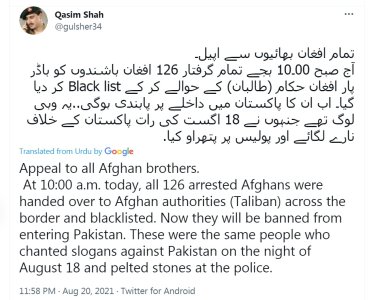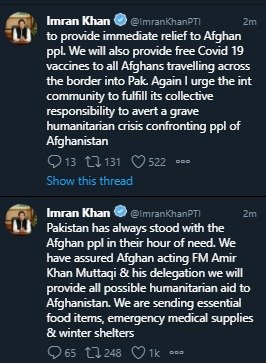Foreign Minister Shah Mahmood Qureshi on Saturday said the Muslim ummah should show its traditional solidarity with the Afghan people in their quest for a peaceful, united, stable, and prosperous country.
The foreign minister's comments came during a telephonic conversation with the Secretary-General of the Organisation of Islamic Cooperation (OIC), Yousef bin Ahmad Al-Othaimeen, in which both sides exchanged views of the rapidly changing situation in Afghanistan, a statement from the Foreign Office said.
The foreign minister emphasised that the international community needed to remain engaged with Afghanistan — through supporting the country’s economy, reconstruction, rehabilitation, and humanitarian needs.
FM Qureshi underscored that Pakistan would continue to play its constructive role in promoting sustainable peace and stability in Afghanistan.
Expressing hope that Afghan parties would work for an inclusive political settlement, the foreign minister said the success of negotiations in Kabul would not only benefit Afghanistan but also the region.
The foreign minister stressed the importance of ensuring the safety, security, and protection of the rights of Afghan people, the Foreign Office's statement said.
"Noting the significance of efforts towards establishing an inclusive government, the foreign minister warned about spoilers within and outside Afghanistan who wanted to take advantage of the situation in the country," the statement said.
The foreign minister highlighted the role played by Pakistan in facilitating the evacuation and relocation of personnel of diplomatic missions, international organisations, media, and others from Afghanistan.
FM Qureshi expressed the hope that the talks in Kabul would succeed, leading to an inclusive and participatory government that would bring lasting peace, progress, and prosperity to Afghanistan.
Meanwhile, Al-Othaimeen apprised Qureshi of the extraordinary meeting of the OIC Executive Meeting that has been convened in Jeddah at the level of ambassadors and permanent representatives tomorrow to discuss the situation in Afghanistan.
Turkey appreciates Pakistan's role in Afghanistan
FM Qureshi also called his Turkish counterpart Mevlut Cavusoglu today to exchange views on bilateral relations and the latest situation in Afghanistan, a separate statement from the Foreign Office said.
The foreign minister stated that the recent visit of President Arif Alvi to Turkey for the launching ceremony of the MILGEM Naval Ship further strengthened bilateral cooperation.
The two foreign ministers also recalled the recent telephone conversation between Prime Minister Imran Khan and President Recep Tayyip Erdogan about developments in Afghanistan.
Reiterating Pakistan’s support for a peaceful, stable, and prosperous Afghanistan, FM Qureshi underlined the importance of an inclusive political solution as the best way forward.
"The foreign minister added that Pakistan’s National Security Committee (NSC) had underscored the importance of peace and stability in Afghanistan for Pakistan and the region," the statement said.
The foreign minister also apprised his Turkish counterpart of Pakistan’s facilitative role in the evacuation of personnel of embassies, international organisations, media entities, and others.
Foreign Minister Cavusoglu appreciated Pakistan’s role in the current situation and thanked FM Qureshi for facilitating Turkey’s evacuation efforts, according to the statement.
The two foreign ministers agreed to coordinate closely on the situation in Afghanistan, the statement added.
Qureshi discusses Afghan situation with Russian FM
FM Qureshi and Russian Foreign Minister Sergei Lavrov also discussed the situation in Afghanistan, a separate Foreign Office statement said.
FM Qureshi emphasised that a peaceful and stable Afghanistan was of critical importance for Pakistan and the region and that Pakistan had consistently supported the Afghan peace process, the statement said.
He added that Pakistan and Russia, as part of Troika Plus, had made valuable contributions to these efforts, the statement said, adding that the two foreign ministers agreed to continue working closely through the Troika Plus format.
"The foreign minister further highlighted that an inclusive political settlement was the best way forward for peace and stability in Afghanistan. Pakistan was fully supporting efforts in that direction," the statement said.
The foreign minister also apprised his Russian counterpart of Pakistan’s outreach to regional countries for consultations on dealing with the challenges arising out of developments in Afghanistan.
FM Qureshi also informed his counterpart Lavrov that upon request of several governments, Pakistan was facilitating the evacuation of their diplomatic personnel, staff of international organisations, media, and others from Afghanistan.
On the bilateral plane, FM Qureshi expressed satisfaction at the upward trajectory of Pakistan-Russia relations. He reiterated the government’s resolve for early implementation of the agreement on the Pakistan Stream Gas Pipeline Project.
"The two Foreign Ministers agreed to boost bilateral cooperation in different areas, enhance high-level exchanges, and remain in close contact on matters relating to Afghanistan," the statement added.
https://www.geo.tv/latest/366370-mu...fghans-fm-qureshi-tells-oic-secretary-general









